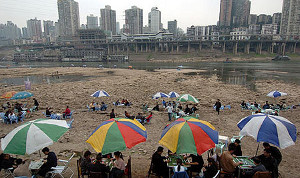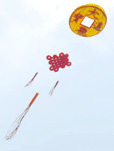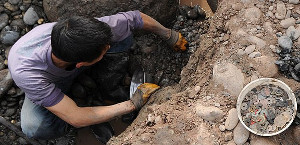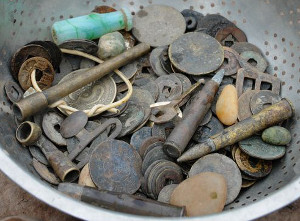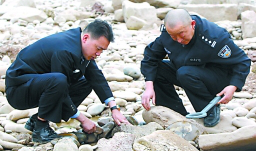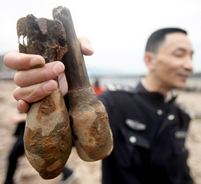The ancient town of Ciqikou (磁器口) is part of the municipality of Chongqing (重庆) located in Southwest China.
Ciqikou actually translates as “Porcelain Port” and the town gained prominence during the Ming Dynasty as a prosperous commercial port located on the Jialing River.
The Jialing River (嘉陵江) is a popular spot for the residents of Ciqikou and Chongqing to relax in the outdoors.
There are open-air tea houses located on the banks of the river. People like to sit under umbrellas and play mahjong (麻将). Young couples can be seen strolling along the river banks.
Children enjoy flying kites in the large open spaces.
Due to recent drought conditions, however, the water level of the Jialing River has dropped to such an extent that large portions of the riverbed are now dry and fully exposed.
The bare riverbed has provided the rare opportunity for residents to partake in a new outdoor activity — digging for “treasure” (淘宝).
In this case, the “treasure” refers to old Chinese coins.
Over the centuries, a number of river boats suffered misfortune and sank to the bottom. Some of their treasures, including coins which had been hidden underwater, can now be found scattered among the rocks and mud of the riverbed.
Most of the coins being found date from the late Qing Dynasty (1644-1911) to the early years of the Republic.
As can be seen in the photos, treasure diggers have been able to recover some of the heretofore buried treasure.
While searching for old Chinese coins in a dry riverbed would seem to be a fairly safe activity, the activity in this case is fraught with danger.
This area of the river not only has old Chinese coins but also a large quantity of buried munitions including rifle rounds, grenades, artillery shells and bombs.
During the Second Sino-Japanese War (1937-1945), Chongqing served as the provisional capital of the Republic of China under the leadership of Generalissimo Chiang Kai-shek.
During this time, Chongqing suffered extensively from aerial attacks by Japanese forces. A very large number of bombs dropped by Japanese planes, but which did not explode, are now being exposed after lying under the waters of the Jialing River for so many years.
This same area also saw fighting between the Communist and Nationalist forces during the Chinese Civil War (1927-1950) and large quantities of grenades, artillery shells and other unexploded ordnance (UXO) are buried in the river.
Unfortunately, many people seem to be unaware of the hidden danger in digging for coins in the river.
According to a recent report, the local police decided to give a demonstration on just how dangerous digging for treasure in the river can be.
As can be seen in the picture at the left, the police officers using a small handheld metal detector were quickly able to locate some hidden explosive materials.
In just 30 minutes they found a hand grenade and a mortar round.
The police also reported that on the same day a “treasure digger” discovered an unexploded 80 kg bomb buried in the riverbed.
According to the police, these munitions still have the ability to explode and cause massive injury and destruction.
In an attempt to convince the treasure hunters not to dig in the river, the local police explained that it would be very difficult to find any large quantity of old Chinese coins at this time. With the passage of time, the treasures of the ancient shipwrecks have either been washed away or are buried deep underground.
The police also posted a sign urging people not to dig for coins because of the potential danger from the undetonated ordnance and also because any found “treasure” would rightfully belong to the state according to law.
But despite the demonstration and the warning about the hidden explosives, people continue to dig in the river searching for old Chinese coins.
